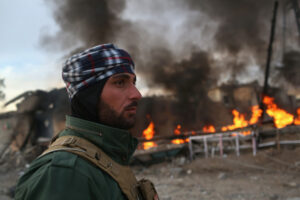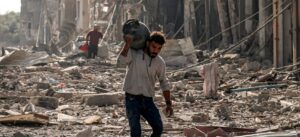While the public’s focus on non-state actor threats is shifting to military action against the Houthis, a resurgent Islamic State (Isis) threat abroad and within the West continues to fester. Three days into 2024, the Islamic State reminded the world of its ability to conduct international attacks with a coordinated pair of suicide bombings in Kerman, Iran, that left 91 people dead. US officials asserted that communication intercepts provided “clear cut and indisputable” evidence that the Islamic State Khurasan Province (ISKP) — Isis’s Afghanistan-Pakistan branch — carried out the operation.
Since the Taliban’s takeover of Afghanistan in August 2021, ISKP has worked to build up its external operations capabilities as well as its propaganda arm to incite violence against its enemies. And this project has largely been successful: ISKP has now carried out multiple attacks inside Iran, fired rockets into Uzbekistan and Tajikistan, and has been involved in multiple violent incidents in the Maldives. The branch also had plots foiled in Iran, India, Turkey, the Maldives, Tajikistan, and Qatar. Most recently, a plan to attack a central square and church in Jalal-Abadin, Kyrgyzstan, during New Year celebrations was disrupted by special services.
Closer to home, ISKP has overtly stated its intention to target the West, adding a new dynamic to the pre-existing threat from Isis’s central apparatus in Iraq and Syria and its supporters abroad. Only last week, it was revealed that a robust transnational ISKP-linked network was the focus of a coordinated series of raids across Europe after foreign intelligence services tipped off the governments of Spain, Germany, and Austria. The Austrian and German cell reportedly sought to target Cologne Cathedral and Vienna’s St. Stephen’s Cathedral. It followed a similar operation last July, when Germany and the Netherlands co-ordinated to dismantle an ISKP-linked network reportedly plotting attacks in Germany.
Ever since March 2019, when the flags of the Syrian Democratic Forces were raised over Isis’s final stronghold in Baghuz, the terror group has been focusing on leveraging events abroad to galvanise and incite its supporters. One such opportunity presented itself last June when an Iraqi asylum seeker in Sweden burned a copy of the Quran outside of the country’s largest mosque. Almost immediately, Isis propagandists tried to use the incident to ignite followers into action. Their weekly al-Naba newsletter, for instance, told its readers to begin “carrying out attacks in the heartland of the kuffar” by “striking their necks and spilling their blood”. ISKP even published a pamphlet critical of the Taliban for failing to condemn the act harshly enough.
Nor did its rhetoric fall on deaf ears. After a similar burning last January, Swedish police detained five men on suspicion of conspiracy to commit terrorist crimes, all of whom were reportedly tied to “international calls for attacks”. In Germany, meanwhile, two brothers were detained for planning a bombing against Swedish targets. One of the two men allegedly told a supporter of Isis that he intended to attack a church in retaliation for the Quran burning. Similar arrests took place in Turkey.
Yet it wasn’t until October 7 that this Islamist impetus really burst into the open, with Isis suddenly finding itself on fertile soil for cultivating new followers in the West. Shortly after Israel commenced its military response to Hamas’s attack, al-Naba ran an editorial titled “Practical Steps to Fight the Jews”. The article criticised Israel’s military action in Gaza, its historical oppression of Palestinians, and scorned the West for its past and present support for Jerusalem. It then went on to call for a “rapid field effort to target the Jewish presence in the entire world”, specifying the need to “target and attack Jewish and Crusader embassies everywhere”. As for desired targets, it identified “the Jewish neighborhoods, in America and Europe”, as they “constitute the backbone of the Jewish economy and the hotbeds of control in Western Crusader decision-making circles supporting the Jewish statelet”.
ISKP, in the latest issue of Voice of Khurasan, its flagship English-language magazine, reproduced a translation of al-Naba’s editorial, as well as a full page exalting various Isis-inspired attacks. Furthermore, it threatened the “Crusader governments” of the West, telling them to prepare for many more such occurrences in the future. The issue also featured a call to “kill the Jews where ever you find [them]” and included an infographic advising its supporters to target tourist sites, educational institutions and music events, as well as what weapons to use: Molotov cocktails, petrol bombs, crossbows, nail guns, knives, and vehicles.
Within a week of October 7, these calls appeared to bear fruit, when a 20-year-old Russian Muslim fatally stabbed a teacher in France outside of a school in Arras. In a video posted beforehand, the alleged perpetrator highlighted the Hamas attack and expressed support for Isis. Three days later, two Swedish soccer fans were gunned down in Brussels by a 45-year-old Tunisian man who claimed to be acting on behalf of the Islamic State. He was later killed by authorities at a cafe. And in Paris, on December 3, a man claiming allegiance to Isis fatally stabbed a German tourist and injured two other people near the Eiffel Tower.
This year, all the signs suggest that Isis will only further ramp up its rhetoric. On 5 January, in a speech titled “And kill them wherever you find them”, spokesman Abu Hudhayfa al-Ansari announced a new campaign of violence, calling for jihadists to target “Jews, Christians or their allies, on the streets and roads of America, Europe, and the world”. He encouraged supporters to “detonate explosives, burn them with grenades and fiery agents, shoot them with bullets, cut their throats with sharp knives, and run them over with vehicles” in order to “let them know that their crimes in Palestine, Iraq, Sham, and other Muslim countries are being retaliated for in their homes in Washington, Paris, London, Rome, and other Kaffir lands”.
The territorial power base of Isis may be far smaller than 10 years ago, when it was its zenith, but it still presents a heightened threat — and to Europe in particular. The attacks and high number of foiled plots in the West signal that these trends will persist. Combined with Western security and intelligence resources stretched to focus on developments involving China, Russia, Iran, and now the Houthis, Isis and its followers may find new opportunities to carry out operations.
Disclaimer
Some of the posts we share are controversial and we do not necessarily agree with them in the whole extend. Sometimes we agree with the content or part of it but we do not agree with the narration or language. Nevertheless we find them somehow interesting, valuable and/or informative or we share them, because we strongly believe in freedom of speech, free press and journalism. We strongly encourage you to have a critical approach to all the content, do your own research and analysis to build your own opinion.
We would be glad to have your feedback.
Source: UnHerd Read the original article here: https://unherd.com/




